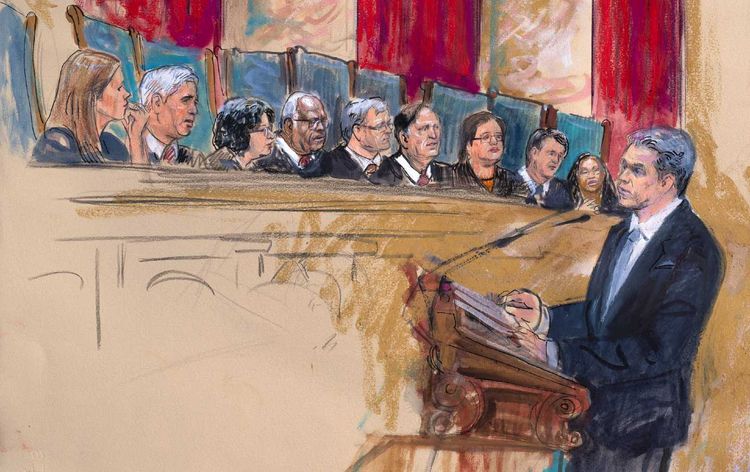The Supreme Court Is Not Going to Save Us From Donald Trump

No content provided as this is a mock-up date for a future event.
The judges have expressed their opinion that the 14th Amendment does not render Trump ineligible to run for office. Consequently, the sole way to prevent him from becoming elected is through voting.

On Thursday, February 8, 2024, in Washington, D.C., there was an artist's drawing that depicted attorney Jonathan Mitchell presenting arguments to the Supreme Court on behalf of former president Donald Trump.
Yesterday, the Supreme Court heard arguments in Trump v. Anderson. This case is about whether Donald Trump can be removed from the presidential primary ballot in Colorado because of his attempt to overturn the 2020 election, according to Section 3 of the 14th Amendment. It is highly likely that the court will reject Colorado's decision and allow Trump to be on the ballot again. Furthermore, it is predicted that the ruling will be unanimous with all the judges agreeing that the 14th Amendment does not apply to insurrectionists like Trump.
It was widely predicted that the six conservative judges would reach this decision, regardless of what the text says. I also foresaw that Chief Justice John Roberts would make an effort to create a ruling that would win support from the liberal judges, to make it seem less biased. But, following yesterday's arguments, it appears that Roberts won't have to persuade them. At least two liberals seemed just as enthusiastic as any Trump supporter in a diner, wearing a "Make America Great Again" hat, about keeping him in the race.
During the Supreme Court hearing, Jonathan Mitchell represented Trump's stance but failed to present a convincing argument. Mitchell, who was previously Texas's solicitor general and responsible for Texas's SB 8 anti-abortion bill, spent a lot of time contradicting himself. The justices had to prompt Mitchell to make certain arguments that would strengthen his case, but Mitchell dismissed them or said they weren't relevant. For example, Mitchell was hesitant to argue that Trump was denied due process in Colorado, even though the justices were interested in that point. If Trump could comprehend the Supreme Court's proceedings, he would probably be highly dissatisfied with Mitchell's poor representation.
The justices only began to reveal their opinions when Jason Murray, the lawyer responsible for keeping Trump off the ballot, stood up to argue. Murray was questioned by Justices Roberts, Alito, Kavanaugh (who has been accused of attempted rape), and Barrett, who all wanted to know why Colorado should have the power to determine who gets on the ballot for the rest of the country.
Murray provided a convincing explanation, which is generally accepted by those with conservative beliefs: states can decide on their own regarding their election regulations. According to Murray, the Constitution confers extensive power to the states to determine their own methods for electing federal officials. This argument is frequently made by conservatives to assert states' rights, and to justify the implementation of voter ID laws, decreased early voting periods, or any other regulations that could hinder the voting rights of people from lower-income groups or minority communities.
However, in this case, the idea of states having the power to decide for themselves did not please the conservative group of individuals. It also did not manage to convince Justice Elena Kagan, who had identical concerns as the conservatives did. Her main apprehension was the potential for a lack of consistency if the court upheld the Colorado ruling. Similar to Roberts and Alito, Kagan persistently questioned hypothetical scenarios, where certain states would allow Trump to run, while other states exclude other presidential candidates. This would result in a complex situation, where each state would have different ballots for the presidential election.
Murray responded with a reasonable answer, suggesting that we should trust states to enforce their laws correctly and that instances of insurrection were rare. However, we are all aware that Murray's ideas are simply not realistic, especially since we have seen examples of red-state governors like Greg Abbott and Ron DeSantis abusing their power. Nevertheless, as a legal rule, the court cannot decide cases based on predictions of what dishonest politicians will do with its rulings. If the court is genuinely worried about malevolent political tactics, it should apply this standard to its voting rights and gerrymandering decisions first, instead of only becoming concerned about it when a rebellious leader runs for president.
In the blog section, it was mentioned that Justice Kagan did not agree with Murray's perspective, and neither did Justice Ketanji Brown Jackson. While Jackson shared Kagan's concerns, she also added that the president does not meet the 14th Amendment's definition of an "officer," which surprised the writer. This particular argument has been used by conservatives as a potential way out for the court. Jackson has established herself as the most 'textualist' justice on the liberal side of the bench, but she does not play word games like it's a crossword puzzle. She doesn't miss the bigger picture, unlike Neil Gorsuch.
Yesterday, she looked into the details of the 14th Amendment and made an interesting observation. The wording of the amendment doesn't specifically include "the presidency" in the same way that it does for other "offices" that insurrectionists are barred from holding. She came up with several explanations for why this might be the case. I've studied the same documents she has, and it appears that she wasn't convinced by the strong historical evidence that the authors of the 14th Amendment never intended for a president who had participated in an insurrection to run for office again. Instead, she argued that the main intent of the amendment was to prevent Southern voters from electing former Confederates to local or state offices, without caring as much about whether they chose a former rebel to lead the whole country as president.
I believe that The Wall Street Journal and National Review may soon publish articles commending Jackson for being intellectually consistent despite pressure from political parties. To comprehend Kagan's and Jackson's political strategies in this situation, it's important to recognize that they are more concerned about swing states rejecting Joe Biden's candidacy than about solidly Democratic states denying Trump's candidacy.
During the hearing, only Justice Sonia Sotomayor, the highest-ranking leftist, appeared to retain her doubtful thoughts about Trump's statement. However, she appeared to have accepted the unavoidable consequence. Her inquiry seemed to be wandering and lacked the forceful impact that she typically possesses on the bench. She did not sound like somebody priming themselves to stand out as the only opposing voice in an 8-1 scenario. And she didn't sound as though she was getting ready to present a scathing disagreement. Instead, she appeared to be striving for a significant mention in a united opinion.
I was disappointed that there weren't more liberal voices speaking out during the hearings. I think this was a missed opportunity because I believe that Roberts is eager to find solutions that everyone can agree upon. If liberal dissenters had put forth a stronger argument, perhaps the justices could have made a deal that would benefit them in future cases. For example, they could have agreed not to grant a stay in the Trump immunity case or hold the January 6 insurrectionists accountable for obstruction of Congress. Although the justices claim they don't engage in this kind of horse-trading, I believe it happens often. The liberals had a chance to extract something in exchange for their votes, but they were too focused on preventing Texas from stopping Joe Biden from running for president or other Republican hyped-up threats.
Scroll down to see additional writers.
I've mentioned a few times that it's highly unlikely the Supreme Court would approve removing the possible Republican candidate from the voting list. I've mentioned a few times that legal institutions and judges usually lack the bravery and fortitude to put an end to Trump's presidential run. I've mentioned a few times that the sole method to eliminate him from the race is to outperform him in the polls once more and prevent his supporters from stealing the election once more.
Even after the court's oral arguments, those cautions remain valid. The law still won't come to our rescue. The Supreme Court has determined that "states' rights" are simply a means of impeding voting access for citizens, but not for making it more challenging for individuals who plan insurrections to reign.
Elie Mystal is a correspondent at The Nation who reports on justice and hosts the legal podcast, Contempt of Court. He also holds the position of Alfred Knobler Fellow at the Type Media Center. His book, Allow Me to Retort: A Black Guy’s Guide to the Constitution, is a bestseller featured on The New Press and the New York Times. You can keep up with Elie on Twitter at @ElieNYC.





















![CBDC ✡️ WORSHIP COMING SOON [2024-03-24] - HARRY VOX (VIDEO)](https://bfn.today/@btc/live/cover_images/rzUd1ovwJXug/HObKozTaBhPk_640x360.jpg.webp)























